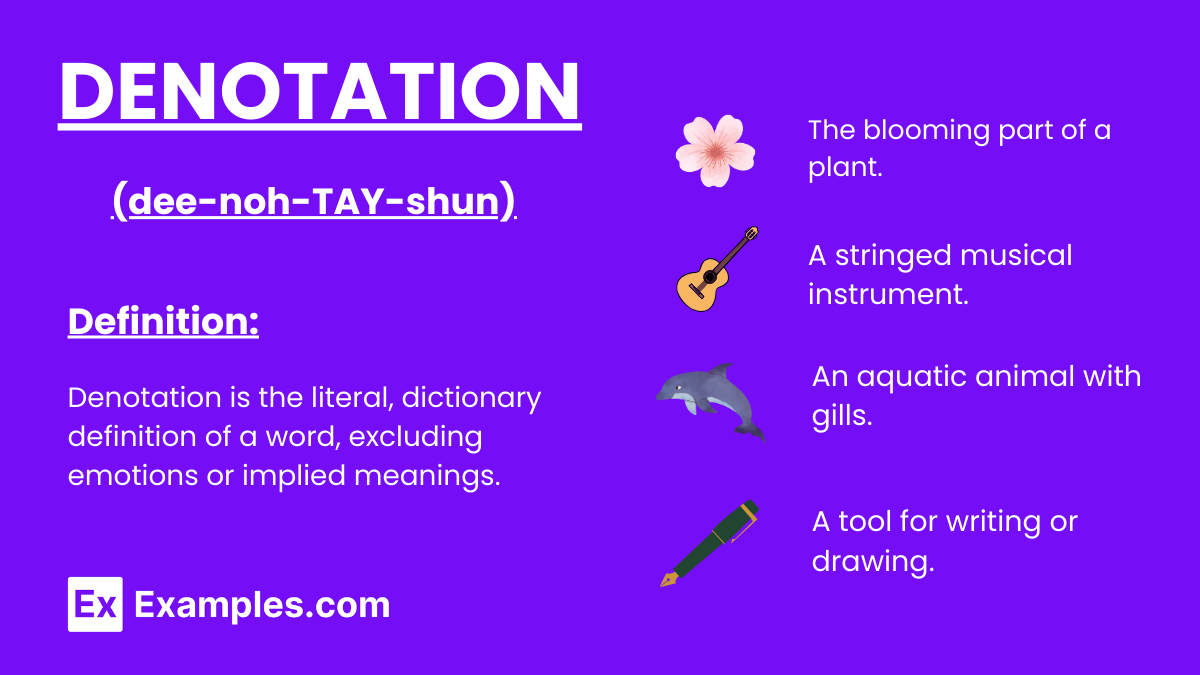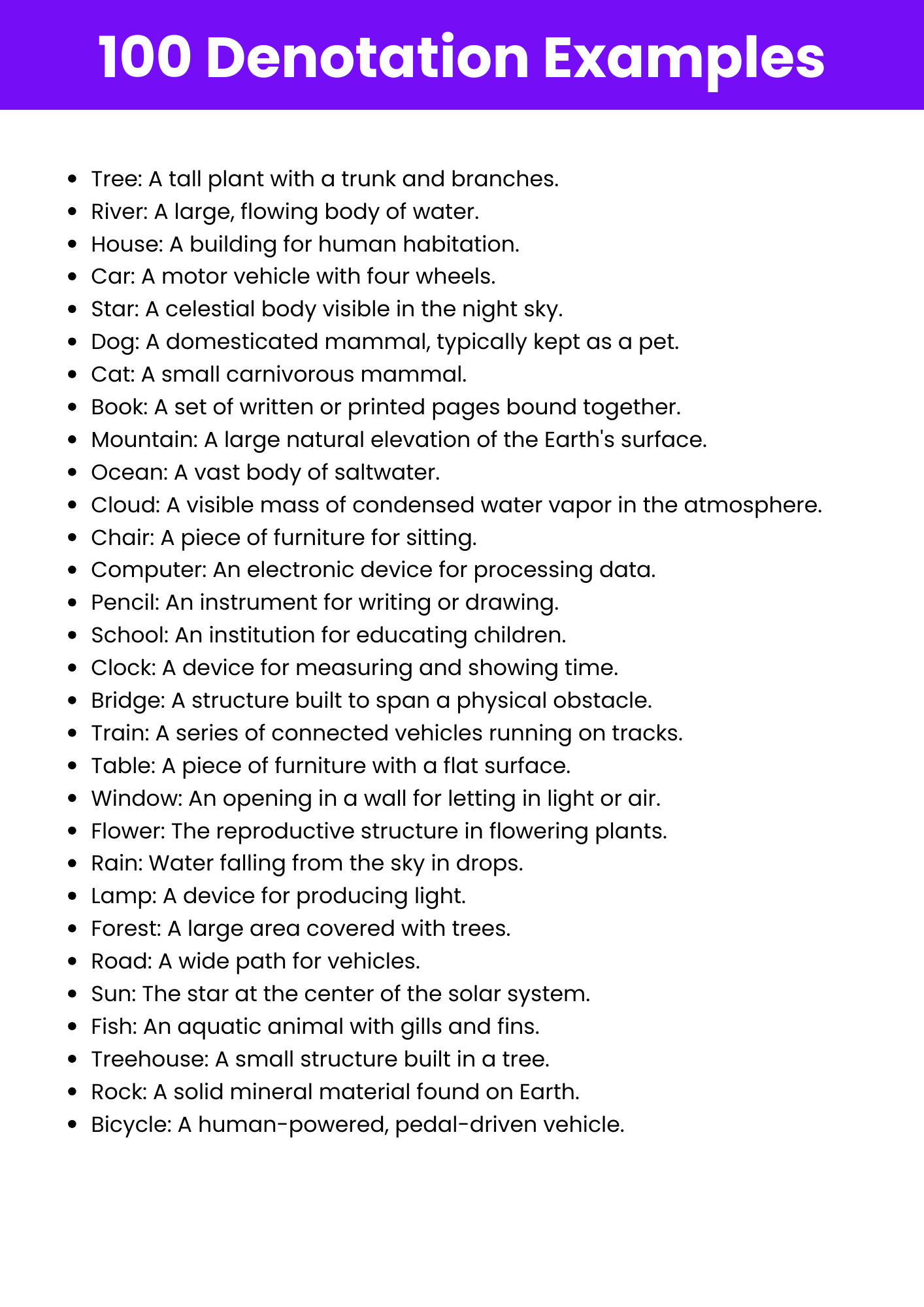Denotation
What is Denotation? – Definition
Denotation refers to the explicit, literal, and dictionary definition of a word or expression, devoid of any emotions, cultural associations, or implied meanings.

Generated Denotation Examples

Download Denotation Examples
Enhance your understanding with our comprehensive PDF guide.
Download PDFExamples of Denotation
- The word “dog” denotes a domesticated animal.
- The word “rose” denotes a type of flower.
- The word “house” denotes a structure for living.
- The word “tree” denotes a perennial plant.
- The term “star” denotes a celestial body.
- The word “cat” denotes a small domesticated animal.
- The term “river” denotes a natural flowing watercourse.
- The word “chair” denotes a piece of furniture.
- The word “plane” denotes an aircraft.
- The term “sun” denotes the star at the center of the solar system.
- The word “water” denotes a liquid essential for life.
- The word “car” denotes a vehicle with four wheels.
- The term “pizza” denotes a dish made of dough, cheese, and toppings.
- The word “apple” denotes a type of fruit.
- The term “mountain” denotes a large natural elevation of the earth’s surface.
- The word “fish” denotes an aquatic animal.
- The term “grass” denotes a type of plant that grows on the ground.
- The word “cloud” denotes a mass of condensed water vapor.
- The word “teacher” denotes a person who teaches.
- The word “song” denotes a musical composition.
- The word “dog” denotes a domesticated mammal.
- The word “ocean” denotes a vast body of saltwater.
- The word “crowd” denotes a large group of people.
- The word “flower” denotes a part of a plant that produces seeds.
- The word “light” denotes a natural agent that makes things visible.
- The word “city” denotes a large and densely populated urban area.
- The word “forest” denotes a large area covered with trees.
- The word “student” denotes a person who is studying.
- The word “job” denotes a paid position of regular employment.
- The word “hospital” denotes a place for medical treatment.
Types of Denotations
Literal Denotation
The straightforward, dictionary meaning of a word or term.
- “Rose” denotes a flower.
- “Dog” denotes a domesticated animal.
- “River” denotes a natural watercourse.
- “Chair” denotes a piece of furniture.
- “Star” denotes a celestial body.
Figurative Denotation
Denotations used in metaphors or symbolic language.
- “Heart” denotes the organ but is often used for love.
- “Torch” denotes a fire source but symbolizes guidance.
- “Crown” denotes royalty but symbolizes power.
- “Tree” denotes a plant but symbolizes growth.
- “Cloud” denotes a weather phenomenon but symbolizes confusion.
Denotation in Literature
Words with precise meanings used to build imagery in texts.
- “Night” denotes the period of darkness.
- “Rain” denotes water falling from the sky.
- “Fire” denotes combustion.
- “Wind” denotes moving air.
- “Ocean” denotes a large body of saltwater.
Scientific Denotation
Technical meanings specific to scientific terminology.
- “Atom” denotes the smallest unit of matter.
- “Gravity” denotes the force attracting bodies toward Earth.
- “Cell” denotes the basic unit of life.
- “Black hole” denotes a region in space with immense gravity.
- “DNA” denotes the molecule that carries genetic information.
Cultural Denotation
Words with literal meanings shaped by cultural context.
- “Dragon” denotes a mythical creature in Asian culture.
- “Cow” denotes a sacred animal in Hindu culture.
- “Eagle” denotes strength in American culture.
- “Lotus” denotes purity in Indian culture.
- “Olive branch” denotes peace in Western culture.
Philosophical Denotation
Denotations used in abstract, philosophical discourse.
- “Being” denotes existence itself.
- “Time” denotes the ongoing sequence of events.
- “Truth” denotes what is factually accurate.
- “Mind” denotes the seat of thought and consciousness.
- “Soul” denotes the spiritual essence of a person.
How to Identify and Understand Denotation?
Identifying denotation involves recognizing the literal or explicit meaning of a word, phrase, or term. This requires focusing on its dictionary definition, without considering implied or emotional meanings.
- Refer to a dictionary for the precise meaning of the word.
- Focus on the literal definition rather than cultural or emotional interpretations.
- Distinguish between denotation (literal meaning) and connotation (emotional or cultural meaning).
- Check for factual and objective meanings in technical or formal contexts.
- Understand how denotation applies across languages and translations.
How to Use Denotation?
Using denotation effectively involves applying the precise, literal meaning of a word to convey clarity and accuracy in communication. This is especially important in technical, legal, or educational contexts.
- Use words with their explicit meanings in academic or formal writing.
- Ensure the denotation of a word matches the context in which it is used.
- Avoid ambiguous terms when precise communication is required.
- Apply literal definitions in discussions about technical or scientific topics.
- Teach the distinction between denotation and connotation to enhance language understanding.
Other Examples of Denotation
Technological Denotation
Words used in technology with clear meanings.
- Algorithm: A process or set of rules in a computer program.
- Server: A computer providing data to other computers.
- Cache: A storage location for quick data access.
- Router: A device that forwards data packets between networks.
- Encryption: A method of securing data.
Mathematical Denotation
Terms with clear meanings in mathematics.
- Pi: The ratio of a circle’s circumference to its diameter.
- Prime: A number divisible only by 1 and itself.
- Matrix: A rectangular array of numbers or symbols.
- Variable: A symbol representing an unknown quantity.
- Infinity: A concept of something without limit.
Historical Denotation
Terms with specific meanings in historical contexts.
- Renaissance: A period of cultural rebirth in Europe.
- Revolution: A forcible overthrow of a government or order.
- Empire: A large territory ruled by a single authority.
- Colony: A territory under the control of another country.
- Industrialization: The development of industries on a large scale.
Emotional Denotation
Words describing emotions with literal meanings.
- Happiness: The state of being happy.
- Sadness: The state of feeling sorrowful.
- Anger: A strong feeling of displeasure or rage.
- Fear: An unpleasant emotion caused by danger or threat.
- Love: An intense feeling of deep affection.
Legal Denotation
Words with specific meanings in law and legal contexts.
- Contract: A legally binding agreement.
- Defendant: A person accused in a court case.
- Plaintiff: A person bringing a case to court.
- Jury: A group of people deciding a court case.
- Verdict: The decision made by a jury.
Medical Denotation
Terms with precise meanings in medicine and healthcare.
- Diagnosis: Identification of a disease.
- Symptom: A physical or mental feature of a disease.
- Therapy: Treatment of a condition.
- Anatomy: The study of body structure.
- Surgery: A medical procedure involving an incision.
Explore Other Literary Devices
Elevate Your AP English Preparation
Unlock your potential with our comprehensive AP English exam preparation tools designed to help you excel.
- Extensive Question Bank: Access 900+ exam-like questions for both AP English Language and Literature.
- Expertly Crafted: Questions mirror the structure and difficulty of actual AP exams, ensuring relevant practice.
- Detailed Explanations: Understand your mistakes with clear, concise breakdowns of correct and incorrect answers.
- Personalized Learning: Tailor your study sessions with topic-specific tests and adaptive learning tools.
- Comprehensive Coverage: Master all aspects of the AP English curriculum with extensive guides and resources.
Frequently Asked Questions
-
What is denotation?
Denotation refers to the literal, dictionary definition of a word, without considering any emotions, associations, or implied meanings. -
How is denotation different from connotation?
Denotation is the exact meaning of a word, while connotation refers to the emotional, cultural, or implied associations a word carries. -
Why is denotation important in communication?
Denotation ensures clarity and precision in communication, especially in technical, legal, or academic contexts where exact meanings are essential. -
Can a word have multiple denotations?
Yes, many words have multiple denotations depending on the context. For example, “bat” can mean a flying mammal or a piece of sports equipment. -
What is an example of denotation?
An example of denotation is the word “rose,” which denotes a type of flower, as per its dictionary definition. -
How do I identify the denotation of a word?
To identify a word’s denotation, refer to a reliable dictionary to find its explicit, literal meaning. -
What is denotation in literature?
In literature, denotation refers to the straightforward meaning of a word, which is often contrasted with its deeper, symbolic, or emotional connotations. -
Is denotation relevant in other fields?
Yes, denotation is crucial in fields like law, science, education, and communication, where precise meanings are required. -
How does denotation help in learning a language?
Learning denotations helps language learners understand the basic meanings of words, forming a foundation for vocabulary and context-based learning. -
Can denotation change over time?
While denotation is generally fixed, some words may evolve to have new literal meanings due to changes in culture, technology, or usage.

